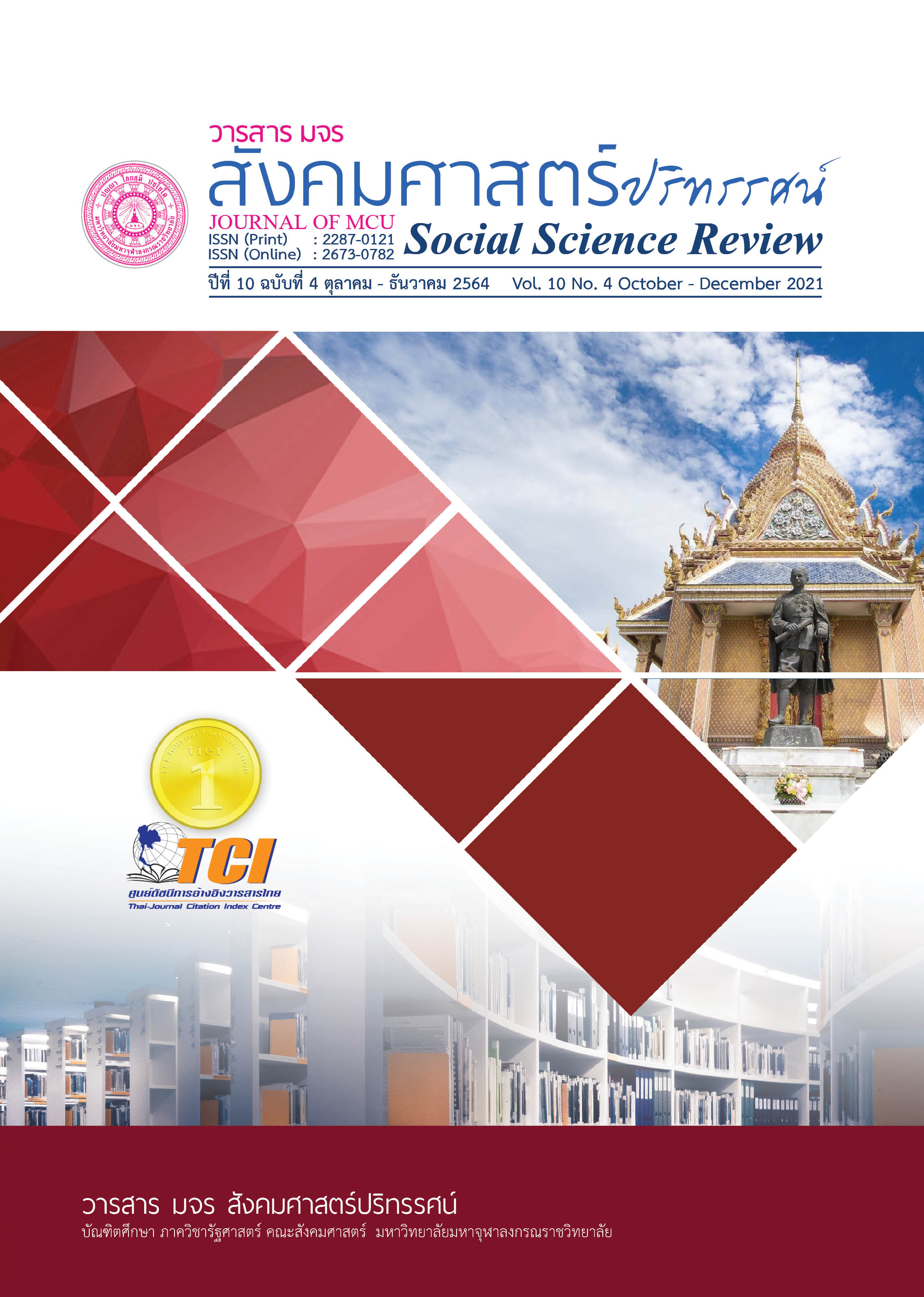ข้อพิจารณาบางประการเกี่ยวกับการกระทำโดยเจตนาที่เป็นความผิดอาญา ของบุคคลตามกฎหมายอาญาและที่เป็นความผิดพระธรรมวินัย ของพระภิกษุตามหลักพุทธศาสนาเถรวาท
คำสำคัญ:
การกระทำโดยรู้สำนึก, การรู้ข้อเท็จจริงอันเป็นองค์ประกอบของความผิดบทคัดย่อ
บทความชิ้นนี้ ผู้เขียนมุ่งศึกษาพิจารราเปรียบเทียบการกระทำโดยเจตนาของบุคคลที่เป็นความผิดอาญาตามกฎหมายอาญาและการกระทำโดยเจตนาของพระภิกษุที่เป็นความผิดพระธรรมวินัยตามหลักพุทธศาสนาเถรวาท ซึ่งผู้เขียนพบว่า ในส่วนขององค์ประกอบความผิดทั้งองค์ประกอบภายนอกและภายในของทั้งสองกรณีศึกษาข้างต้นนั้น มีความคล้ายคลึงเป็นไปในทำนองเดียวกันในหลายประการ และมีข้อแตกต่างกันเล็กน้อยในบางประการ กล่าวคือ 1) ในส่วนคำอธิบายความหมายของการกระทำโดยเจตนาทั้งในทางกฎหมายอาญาและในทางพระธรรมวินัยนั้นต่างอธิบายตรงกันคือ ผู้กระทำจะต้องมีองค์ประกอบในส่วนการรู้สองประการ คือ (1) ส่วนรู้สำนึกในการกระทำ (2) ส่วนรู้ข้อเท็จจริงอันเป็นองค์ประกอบภายใน ทั้งในทางกฎหมายอาญาและพระธรรมวินัยนั้น ในทางกฎมหายอาญา ผู้กระทำจะต้องรับผิดทั้งกรณีเจตนาประสงค์ต่อผลและเจตนาย่อมเล็งเห็นผล ส่วนในทางพระธรรมวินัยนั้น ผู้กระทำจะต้องรับผิดทางพระธรรมวินัยเฉพาะการกระทำโดยมีเจตนาประสงค์ต่อผล (จงใจกระทำ) เท่านั้น
เอกสารอ้างอิง
ทวีเกียรติ์ มีนะกนิษฐ์. (2563). ประมวลกฎหมายอาญา: ฉบับอ้างอิง (พิมพ์ครั้งที่ 43). กรุงเทพฯ: สำนักพิมพ์วิญญูชน.
เนติบัณฑิตยสภา. (2486). คำพิพากษาศาลฎีกา ที่ 497/2486 ขศ.3. กรุงเทพฯ: บริษัท ศรีสมบัติการพิมพ์ จำกัด.
_________. (2489). คำพิพากษาศาลฎีกา ที่ 1345/2489. กรุงเทพฯ: บริษัท ศรีสมบัติการพิมพ์ จำกัด.
_________. (2502). คำพิพากษาศาลฎีกา ที่ 552/2502. กรุงเทพฯ: บริษัท ศรีสมบัติการพิมพ์ จำกัด.
_________. (2510). คำพิพากษาศาลฎีกา ที่ ที่ 769/2510, ที่ 1439/2510. กรุงเทพฯ: บริษัท ศรีสมบัติการพิมพ์ จำกัด.
_________. (2512). คำพิพากษาศาลฎีกา ที่ 417/2512. กรุงเทพฯ: บริษัท ศรีสมบัติการพิมพ์ จำกัด.
_________. (2514). คำพิพากษาศาลฎีกา ที่ 1818/2514. กรุงเทพฯ: บริษัท ศรีสมบัติการพิมพ์ จำกัด.
_________. (2518). คำพิพากษาศาลฎีกา ที่ 900/2518. กรุงเทพฯ: บริษัท ศรีสมบัติการพิมพ์ จำกัด.
_________. (2521). คำพิพากษาศาลฎีกา ที่ 1563/2521. กรุงเทพฯ: บริษัท ศรีสมบัติการพิมพ์ จำกัด.
_________. (2527). คำพิพากษาศาลฎีกา ที่ 278/2527, ที่ 2377/2527. กรุงเทพฯ: บริษัท ศรีสมบัติการพิมพ์ จำกัด.
_________. (2529). คำพิพากษาศาลฎีกา ที่ 847/2529. กรุงเทพฯ: บริษัท ศรีสมบัติการพิมพ์ จำกัด.
_________. (2534). คำพิพากษาศาลฎีกา ที่ 2154/2534, ที่ 2522/2534 ฏส.6. กรุงเทพฯ: บริษัท ศรีสมบัติการพิมพ์ จำกัด.
_________. (2535). คำพิพากษาศาลฎีกา ที่ 3431/2535, ที่ 3779/2535 ฎส.10. กรุงเทพฯ: บริษัท กรุงสยาม พริ้นติ้ง กรุ๊พ จำกัด.
_________. (2544). คำพิพากษาศาลฎีกา ที่ 2567/2544. กรุงเทพฯ: ห้างหุ้นส่วนจำกัด โรงพิมพ์ ชวนพิมพ์.
ปลื้ม โชติษฐยางกูร. (2559). คำบรรยายกฎหมายคณะสงฆ์ (พิมพ์ครั้งที่ 3). พระนครศรีอยุธยา: โรงพิมพ์มหาจุฬาลงกรณราชวิทยาลัย.
หยุด แสงอุทัย. (2551). กฎหมายอาญา 1 (พิมพ์ครั้งที่ 20). กรุงเทพฯ: มหาวิทยาลัยธรรมศาสตร์.
ดาวน์โหลด
เผยแพร่แล้ว
รูปแบบการอ้างอิง
ฉบับ
ประเภทบทความ
สัญญาอนุญาต
ลิขสิทธิ์ (c) 2021 วารสาร มจร สังคมศาสตร์ปริทรรศน์

อนุญาตภายใต้เงื่อนไข Creative Commons Attribution-NonCommercial-NoDerivatives 4.0 International License.
เพื่อให้เป็นไปตามกฎหมายลิขสิทธิ์ ผู้นิพนธ์ทุกท่านต้องลงลายมือชื่อในแบบฟอร์มใบมอบลิขสิทธิ์บทความให้แก่วารสารฯ พร้อมกับบทความต้นฉบับที่ได้แก้ไขครั้งสุดท้าย นอกจากนี้ ผู้นิพนธ์ทุกท่านต้องยืนยันว่าบทความต้นฉบับที่ส่งมาตีพิมพ์นั้น ได้ส่งมาตีพิมพ์เฉพาะในวารสาร มจร สังคมศาสตร์ปริทรรศน์ เพียงแห่งเดียวเท่านั้น หากมีการใช้ภาพหรือตารางหรือเนื้อหาอื่นๆ ของผู้นิพนธ์อื่นที่ปรากฏในสิ่งตีพิมพ์อื่นมาแล้ว ผู้นิพนธ์ต้องขออนุญาตเจ้าของลิขสิทธิ์ก่อน พร้อมทั้งแสดงหนังสือที่ได้รับการยินยอมต่อบรรณาธิการ ก่อนที่บทความจะได้รับการตีพิมพ์ หากไม่เป็นไปตามข้อกำหนดเบื้องต้น ทางวารสารจะถอดบทความของท่านออกโดยไม่มีข้อยกเว้นใดๆ ทั้งสิ้น





